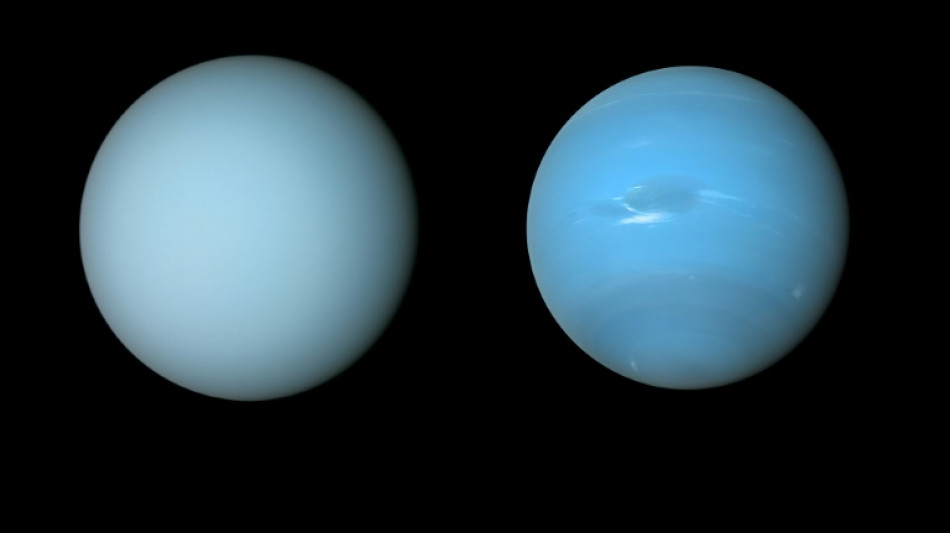
-
 Iraq's top Shiite cleric says Pope Francis sought peace
Iraq's top Shiite cleric says Pope Francis sought peace
-
Mourners flock to world's churches to grieve Pope Francis

-
 Trump says Pope Francis 'loved the world'
Trump says Pope Francis 'loved the world'
-
Sri Lanka recalls Pope Francis' compassion on Easter bombing anniversary

-
 Pope Francis inspired IOC president Bach to create refugee team
Pope Francis inspired IOC president Bach to create refugee team
-
Alexander-Arnold will be remembered for 'good things' at Liverpool: Van Dijk

-
 US VP Vance meets Indian PM Modi for tough talks on trade
US VP Vance meets Indian PM Modi for tough talks on trade
-
Pentagon chief dismisses reports he shared military info with wife

-
 15 potential successors to Pope Francis
15 potential successors to Pope Francis
-
The papabili - 15 potential successors to Pope Francis

-
 Zhao sets up all-China clash after beating 2024 world snooker finalist Jones
Zhao sets up all-China clash after beating 2024 world snooker finalist Jones
-
Ostapenko stuns Sabalenka to win Stuttgart title

-
 Argentina mourns loss of papal son
Argentina mourns loss of papal son
-
African leaders praise Pope Francis's 'legacy of compassion'

-
 Mehidy's five wickets help Bangladesh fight back in first Zimbabwe Test
Mehidy's five wickets help Bangladesh fight back in first Zimbabwe Test
-
'The voice of god': Filipinos wrestle with death of Pope Francis

-
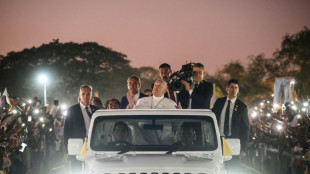 Prayers, disbelief in East Timor after Pope Francis death
Prayers, disbelief in East Timor after Pope Francis death
-
Real Madrid hold minute's silence as La Liga mourns Pope Francis

-
 World leaders pay tribute to Pope Francis, dead at 88
World leaders pay tribute to Pope Francis, dead at 88
-
World leaders react to the death of Pope Francis

-
 Zimbabwe lead first Test despite Bangladesh spinner Mehidy's five wickets
Zimbabwe lead first Test despite Bangladesh spinner Mehidy's five wickets
-
Vatican postpones sainthood for 'God's influencer' after pope's death

-
 Pope's death prompts CONI to call for sporting postponements, minute's silence
Pope's death prompts CONI to call for sporting postponements, minute's silence
-
Stunned and sad, faithful gather at St Peter's to remember Francis

-
 Asian scam centre crime gangs expanding worldwide: UN
Asian scam centre crime gangs expanding worldwide: UN
-
Davos meet founder Klaus Schwab steps down from WEF board

-
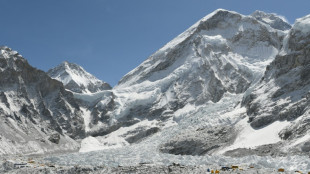 Himalayan snow at 23-year low, threatening 2 billion people: report
Himalayan snow at 23-year low, threatening 2 billion people: report
-
The beautiful game: Pope Francis's passion for football

-
 Clerical sex abuse: Pope Francis's thorniest challenge
Clerical sex abuse: Pope Francis's thorniest challenge
-
Pope Francis's delicate ties with politics in Argentina

-
 Russia resumes attacks on Ukraine after Easter truce
Russia resumes attacks on Ukraine after Easter truce
-
Pope Francis has died aged 88

-
 Gaza civil defence describes medic killings as 'summary executions'
Gaza civil defence describes medic killings as 'summary executions'
-
Francis: radical leader who broke the papal mould

-
 Oscar stars, Max keeps mum, Sainz alive - Saudi GP talking points
Oscar stars, Max keeps mum, Sainz alive - Saudi GP talking points
-
Iyer, Kishan win back India contracts as Pant's deal upgraded

-
 Vance lands in India for tough talks on trade
Vance lands in India for tough talks on trade
-
Inside South Africa's wildlife CSI school helping to catch poachers
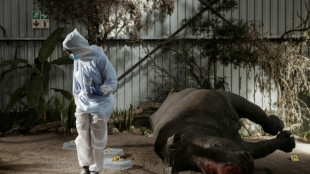
-
 Nigerian Afrobeat legend Femi Kuti takes a look inward
Nigerian Afrobeat legend Femi Kuti takes a look inward
-
Kim Kardashian: From sex tape to Oval Office via TV and Instagram

-
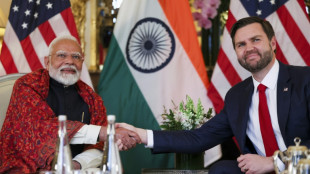 Vance in India for tough talks on trade
Vance in India for tough talks on trade
-
Thunder crush Grizzlies as Celtics, Cavs and Warriors win

-
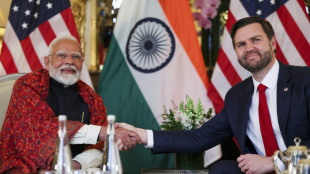 Vance heads to India for tough talks on trade
Vance heads to India for tough talks on trade
-
China slams 'appeasement' of US as nations rush to secure trade deals

-
 'Grandpa robbers' go on trial for Kardashian heist in Paris
'Grandpa robbers' go on trial for Kardashian heist in Paris
-
Swede Lindblad gets first win in just third LPGA start

-
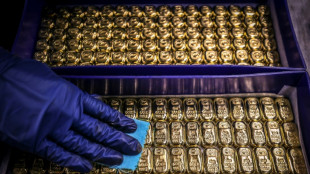 Gold hits record, dollar drops as tariff fears dampen sentiment
Gold hits record, dollar drops as tariff fears dampen sentiment
-
As Dalai Lama approaches 90, Tibetans weigh future

-
 US defense chief shared sensitive information in second Signal chat: US media
US defense chief shared sensitive information in second Signal chat: US media
-
Swede Lingblad gets first win in just third LPGA start


It's raining diamonds across the universe, research suggests
It could be raining diamonds on planets throughout the universe, scientists suggested Friday, after using common plastic to recreate the strange precipitation believed to form deep inside Uranus and Neptune.
Scientists had previously theorised that extremely high pressure and temperatures turn hydrogen and carbon into solid diamonds thousands of kilometres below the surface of the ice giants.
Now new research, published in Science Advances, inserted oxygen into the mix, finding that "diamond rain" could be more common than thought.
Ice giants like Neptune and Uranus are thought to be the most common form of planet outside our Solar System, which means diamond rain could be occurring across the universe.
Dominik Kraus, a physicist at Germany's HZDR research lab and one of the study's authors, said that diamond precipitation was quite different to rain on Earth.
Under the surface of the planets is believed to be a "hot, dense liquid", where the diamonds form and slowly sink down to the rocky, potentially Earth-size cores more than 10,000 kilometres (6,200 miles) below, he said.
There fallen diamonds could form vast layers that span "hundreds of kilometres or even more", Kraus told AFP.
While these diamonds might not be shiny and cut like a "a nice gem on a ring", he said they were formed via similar forces as on Earth.
Aiming to replicate the process, the research team found the necessary mix of carbon, hydrogen and oxygen in a readily available source -- PET plastic, which is used for everyday food packaging and bottles.
Kraus said that while the researchers used very clean PET plastic, "in principle the experiment should work with Coca-Cola bottles".
The team then turned a high-powered optical laser on the plastic at the SLAC National Accelerator Laboratory in California.
"Very, very short X-ray flashes of incredible brightness" allowed them to watch the process of nanodiamonds -- tiny diamonds too small to see with the naked eye -- as they formed, Kraus said.
"The oxygen that is present in large amounts on those planets really helps suck away the hydrogen atoms from the carbon, so it's actually easier for those diamonds to form," he added.
- New way to make nanodiamonds? -
The experiment could point towards a new way to produce nanodiamonds, which have a wide and increasing range of applications including drug delivery, medical censors, non-invasive surgery and quantum electronics.
"The way nanodiamonds are currently made is by taking a bunch of carbon or diamond and blowing it up with explosives," said SLAC scientist and study co-author Benjamin Ofori-Okai.
"Laser production could offer a cleaner and more easily controlled method to produce nanodiamonds," he added.
The diamond rain research remains hypothetical because little is known about Uranus and Neptune, the most distant planets in our Solar System.
Only one spacecraft -- NASA's Voyager 2 in the 1980s -- has flown past the two ice giants, and the data it sent back is still being used in research.
But a NASA group has outlined a potential new mission to the planets, possibly launching next decade.
"That would be fantastic," Kraus said.
He said he is greatly looking forward to more data -- even if it takes a decade or two.
F.Pavlenko--BTB




